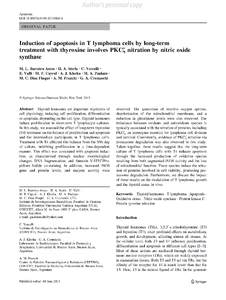Por favor, use este identificador para citar o enlazar este ítem:
https://repositorio.uca.edu.ar/handle/123456789/15265| Título: | Induction of apoptosis in T lymphoma cells by long-term treatment with thyroxine involves PKCf nitration by nitric oxide synthase | Autor: | Barreiro Arcos, María Laura Sterle, Helena Andrea Vercelli, C. Valli, Eduardo Cayrol, María Florencia Klecha, Alicia Juana Paulazo, Maria Alejandra Díaz Flaqué, María Celeste Franchi, A. M. Cremaschi, Graciela A. |
Palabras clave: | APOPTOSIS; ADN; GENES; MITOCONDRIA; NITRATOS; PROTEINAS; TIEMPO; LINFOMA DE CELULAS T | Fecha de publicación: | 2013 | Editorial: | Springer | Cita: | Barreiro Arcos, M.L. Induction of apoptosis in T lymphoma cells by long-term treatment with thyroxine involves PKCf nitration by nitric oxide synthase [en línea]. Apoptosis. 2013. 18(11) doi:10.1007/s10495-013-0869-8 Disponible en: https://repositorio.uca.edu.ar/handle/123456789/15265 | Resumen: | Abstract: Thyroid hormones are important regulators of cell physiology, inducing cell proliferation, differentiation or apoptosis, depending on the cell type. Thyroid hormones induce proliferation in short-term T lymphocyte cultures. In this study, we assessed the effect of long-term thyroxine (T4) treatment on the balance of proliferation and apoptosis and the intermediate participants in T lymphoma cells. Treatment with T4 affected this balance from the fifth day of culture, inhibiting proliferation in a time-dependent manner. This effect was associated with apoptosis induction, as characterized through nuclear morphological changes, DNA fragmentation, and Annexin V-FITC/Propidium Iodide co-staining. In addition, increased iNOS gene and protein levels, and enzyme activity were observed. The generation of reactive oxygen species, depolarization of the mitochondrial membrane, and a reduction in glutathione levels were also observed. The imbalance between oxidants and antioxidants species is typically associated with the nitration of proteins, including PKCζ, an isoenzyme essential for lymphoma cell division and survival. Consistently, evidence of PKCζ nitration via proteasome degradation was also observed in this study. Taken together, these results suggest that the long-term culture of T lymphoma cells with T4 induces apoptosis through the increased production of oxidative species resulting from both augmented iNOS activity and the loss of mitochondrial function. These species induce the nitration of proteins involved in cell viability, promoting proteasome degradation. Furthermore, we discuss the impact of these results on the modulation of T lymphoma growth and the thyroid status in vivo. | URI: | https://repositorio.uca.edu.ar/handle/123456789/15265 | ISSN: | 1573-675X (online) 1360-8185 |
Disciplina: | MEDICINA | DOI: | 10.1007/s10495-013-0869-8 | Derechos: | info:eu-repo/semantics/closedAccess | Fuente: | Apoptosis. 2013. 18(11) |
| Aparece en las colecciones: | Artículos |
Ficheros en este ítem:
| Fichero | Descripción | Tamaño | Formato | |
|---|---|---|---|---|
| thumb.jpg | 409,68 kB | JPEG |  Visualizar/Abrir | |
| Induction-apoptosis-T-lymphoma.pdf | 806 kB | Adobe PDF | SOLICITAR ACCESO |
Visualizaciones de página(s)
78
comprobado en 27-abr-2024
Descarga(s)
21
comprobado en 27-abr-2024
Google ScholarTM
Ver en Google Scholar
Altmetric
Altmetric
Este ítem está sujeto a una Licencia Creative Commons

